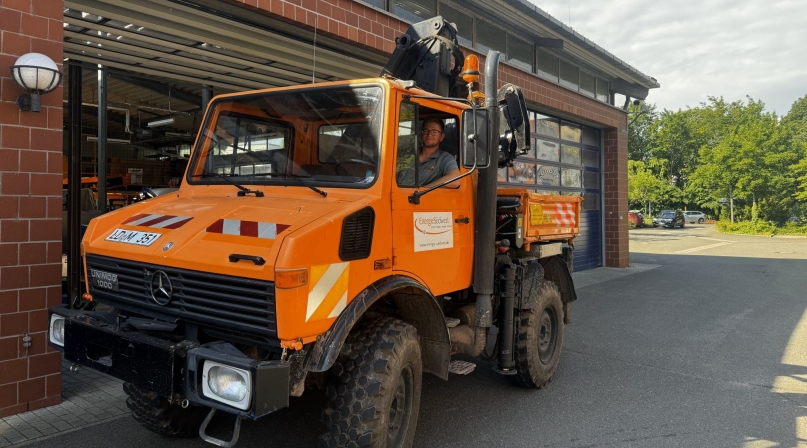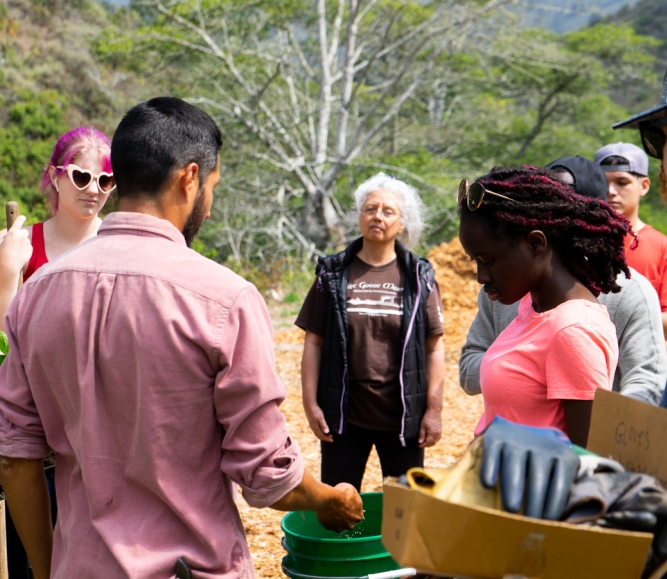Exchange program widens horizons for county employees

Key Takeaways
When Mitchell Wilkins and Stevie Mirrop joined the Pasco County, Fla. staff, they had no indication their utility and veterinary work would involve much travel, if any.
But in May, the pair found themselves working in Germany as part of a three-week exchange program through Rotary International that broadened their professional horizons and offered them a chance for personal growth. The county paid them during the trip — they worked five days a week — and the local Rotary club covered most of their expenses, which totaled $3,000 per participant.
It wasn’t exactly a direct exchange: Mirrop, a veterinary tech for Pasco Animal Services, worked for a private veterinary hospital and Wilkins, who works for Pasco County Utilities, worked for a private utility provider, but both came away with ideas and approaches they hoped they could import into their roles back in the Florida public sector.
“I’ve already talked to my boss about things I’d like to try to implement here,” Wilkins said. “Their main goal for sending me over there is to see how Germany’s infrastructure works and then when I come back, try to see what we can improve on and bring it over here to the U.S.”
Likewise, Mirrop saw how her host veterinary hospital dramatically limits waste, which she thinks her agency, which operates on donations, could benefit from.
“Anything we can do to cut down on the supplies we have to purchase will help,” she said.
But the opportunity also offered them a chance to explore a new country and immerse themselves in a foreign culture, all qualities prized by Pasco County Commissioner Kathryn Starkey, who is a strong advocate for international trade and exchange.
During years of travel to Germany, Starkey developed relationships with local officials that blossomed into a high school exchange program, and later, a friendship agreement.
“It’s like being sister cities, but we can’t truly be sister cities because Pasco County is mostly unincorporated,” she said.
Three weeks away from work is a small price to pay, Starkey said, for the knowledge they brought home.
“Cultural exchanges strengthen both communities,” she said.
“When you learn how other governments work and societies work, it just broadens your horizons and I think there’s much to learn from other countries.”
“To have two of our young county workers be able to go and experience the business culture in Germany will only improve our culture,” she noted.
It’s the little differences
Mirrop is an avid traveler. Wilkins had never been away from home for more than four days. She worked in Germersheim, in southwestern Germany near the French border, he was roughly an hour away in Landau.
“I had only been outside of Florida a few times and had never been on a plane before,” Wilkins said.
“The cultural immersion was my favorite part, and seeing buildings that are older than the United States really showed how they build things to last over there.”
Mirrop had not yet been to Germany, but her grandfather had spent time there after World War II, where he met his wife.
And thanks to her visit, Mirrop was able to connect with a childhood friend of her late grandmother.
“It was a connection to my family I never thought I’d be able to make,” she said. Wilkins was struck by the difference in the built environment, particularly roads.
“They’re so narrow and people drive small cars,” he said. “In Florida, about 70% of people drive trucks, so that’s a real adjustment you make when you’re looking around.”
Mirrop had interacted with German exchange participants before, but Wilkins had not, and he got a lot out of interacting with a new culture.
“One thing that stood out to me is that when someone in Germany offers you something, it’s rude to turn it down, even if it’s just a glass of water,” Wilkins said.
“It’s like you’re telling them something must be wrong with the water if you won’t accept it, so I made it a point to say ‘yes’ to everything. But it also showed me how generous everyone was.”
As for the work, Mirrop was able to scrub in for surgeries, watch dental examinations, perform pre-surgical protocols and perform CT scans.
What impressed her most was the resources the hospital had to be able to bring different elements of care together in one place to expedite various processes.
“It was like human medicine in a way,” she said.
“There were a lot more resources because it was a private hospital, and they were able to perform elaborate surgeries and orthopedic medicine that is not an option for a shelter. Most of the time, we’re trying to get rescuer operations to fund care for animals. It makes us innovative out of necessity, but it’s amazing to see what’s possible when clients are able to pay at a private hospital.”
The water treatment process was also dramatic for Wilkins, who noted that 60% of the water is drawn from mountain runoff and Florida simply doesn’t have mountains and has to draw from aquifers.
“They do things very differently over there,” Wilkins said. “The American standard is to treat water with chlorine and fluoride, but they run it through a sand filter, then a membrane filter and treat it with ultraviolet light and send it on its way.”
He doesn’t think American water treatment plants will make wholesale shifts to the way they operate, but just seeing the way a different system works opened his mind to new ways of engineering infrastructure systems.
Starkey wants to get more county staffers involved in the program, and get more counties across the United States participating in similar exchanges.
“It’s our goal to have more friendship agreements with other parts of the world. We really look at international connections as low hanging fruit for foreign direct investment and onshoring, so having these relationships with local governments there and their business community only helps our business community and our government.”
But for all of his readiness to be open to new experiences, there was one challenge that Wilkins, who had never been outside of the Eastern Time Zone was not ready for — jet lag.
“I couldn’t keep my eyes open that first day,” he said. “I was in meetings at work and kept falling asleep. I was trying not to be rude, but I just couldn’t do it.”
Related News

Congress reauthorizes Economic Development Administration for first time in 20 years
The agreement, for the first time in 20 years, would reauthorize the Economic Development Administration (EDA).

Counties Applaud Passage of WRDA/EDA Package
Omnibus package will advance county interests in economic development, water infrastructure

County Countdown – December 16, 2024
Every other week, NACo's County Countdown reviews top federal policy advocacy items with an eye towards counties and the intergovernmental partnership.
County News
Student rural-urban exchange program aims to bridge America’s cultural divide

